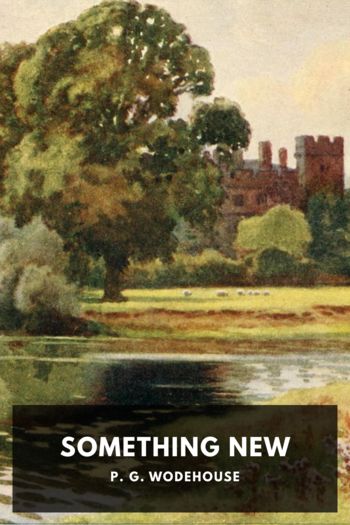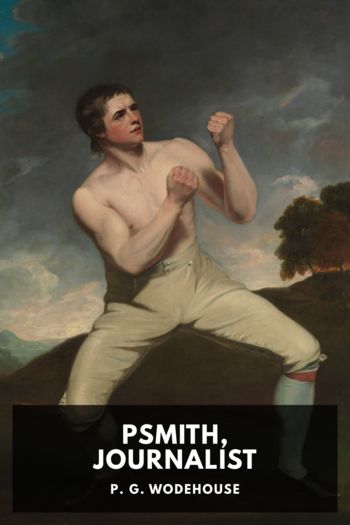Leave It to Psmith - P. G. Wodehouse (i wanna iguana read aloud .TXT) 📗

- Author: P. G. Wodehouse
Book online «Leave It to Psmith - P. G. Wodehouse (i wanna iguana read aloud .TXT) 📗». Author P. G. Wodehouse
“Good Lord! Fancy that!”
“Fancy what, Comrade Threepwood?”
“Fancy your knowing Phyllis and her husband.”
“It is odd, no doubt. But true. Many a whack at the cold beef have I had on Sunday evenings under their roof, and I am much obliged to you for putting in my way this opportunity of repaying their hospitality. Thank you!”
“Oh, that’s all right,” said Freddie, somewhat bewildered by this eloquence.
“Even if the little enterprise meets with disaster, the reflection that I did my best for the young couple will be a great consolation to me when I am serving my bit of time in Wormwood Scrubbs. It will cheer me up. The jailers will cluster outside the door to listen to me singing in my cell. My pet rat, as he creeps out to share the crumbs of my breakfast, will wonder why I whistle as I pick the morning’s oakum. I shall join in the hymns on Sundays in a way that will electrify the chaplain. That is to say, if anything goes wrong and I am what I believe is technically termed ‘copped.’ I say ‘if,’ ” said Psmith, gazing solemnly at his companion. “But I do not intend to be copped. I have never gone in largely for crime hitherto, but something tells me I shall be rather good at it. I look forward confidently to making a nice, clean job of the thing. And now, Comrade Threepwood, I must ask you to excuse me while I get the half-nelson on this rather poisonous poetry of good old McTodd’s. From the cursory glance I have taken at it, the stuff doesn’t seem to mean anything. I think the boy’s non compos. You don’t happen to understand the expression ‘Across the pale parabola of Joy,’ do you? … I feared as much. Well, pip-pip for the present, Comrade Threepwood. I shall now ask you to retire into your corner and amuse yourself for a while as you best can. I must concentrate, concentrate.”
And Psmith, having put his feet up on the opposite seat and reopened the mauve volume, began to read. Freddie, his mind still in a whirl, looked out of the window at the passing scenery in a mood which was a nice blend of elation and apprehension.
IIIAlthough the hands of the station clock pointed to several minutes past nine, it was still apparently early evening when the train drew up at the platform of Market Blandings and discharged its distinguished passengers. The sun, taken in as usual by the never-failing practical joke of the Daylight Saving Act, had only just set, and a golden afterglow lingered on the fields as the car which had met the train purred over the two miles of country road that separated the little town from the castle. As they passed in between the great stone gateposts and shot up the winding drive, the soft murmur of the engines seemed to deepen rather than break the soothing stillness. The air was fragrant with indescribable English scents. Somewhere in the distance sheep-bells tinkled; rabbits, waggling white tails, bolted across the path; and once a herd of agitated deer made a brief appearance among the trees. The only thing that disturbed the magic hush was the fluting voice of Lord Emsworth, on whom the spectacle of his beloved property had acted as an immediate stimulant. Unlike his son Freddie, who sat silent in his corner wrestling with his hopes and fears, Lord Emsworth had plunged into a perfect Niagara of speech the moment the car entered the park. In a high tenor voice, and with wide, excited gestures, he pointed out to Psmith oaks with a history and rhododendrons with a past: his conversation as they drew near the castle and came in sight of the flowerbeds taking on an almost lyrical note and becoming a sort of anthem of gladness, through which, like some theme in the minor, ran a series of opprobrious observations on the subject of Angus McAllister.
Beach, the butler, solicitously scooping them out of the car at the front door, announced that her ladyship and Miss Peavey were taking their after-dinner coffee in the arbour by the bowling-green; and presently Psmith, conducted by his lordship, found himself shaking hands with a strikingly handsome woman in whom, though her manner was friendliness itself, he could detect a marked suggestion of the formidable. Aesthetically, he admired Lady Constance’s appearance, but he could not conceal from himself that in the peculiar circumstances he would have preferred something rather more fragile and drooping. Lady Constance conveyed the impression that anybody who had the choice between stealing anything from her and stirring up a nest of hornets with a short walking-stick would do well to choose the hornets.
“How do you do, Mr. McTodd?” said Lady Constance with great amiability. “I am so glad you were able to come after all.”
Psmith wondered what she meant by “after all,” but there were so many things about his present situation calculated to tax the mind that he had no desire to probe slight verbal ambiguities. He shook her hand and replied that it was very kind of her to say so.
“We are quite a small party at present,” continued Lady Constance, “but we are expecting a number of people quite soon. For the moment Aileen and you are our only guests. Oh, I am sorry, I should have … Miss Peavey, Mr. McTodd.”
The slim and willowy female who during this brief conversation had been waiting in an attitude of suspended animation, gazing at Psmith with large, wistful eyes, stepped forward. She clasped Psmith’s hand in hers, held it, and in a low, soft voice, like thick cream made audible, uttered one





Comments (0)